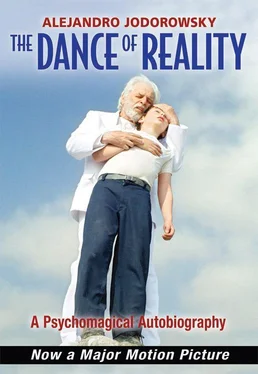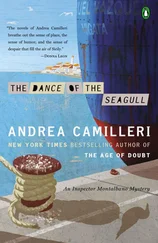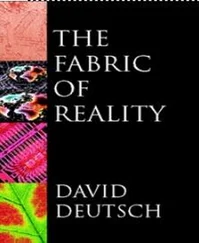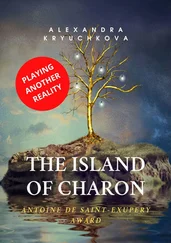By a thousand ingenious methods (including selling myself for a couple of nights to an elderly millionairess), I earned the money to buy passage on an Italian ship, the Andrea Doria —fourth class, in a dormitory with twenty beds, living on dried scallops, wine made from water and powder, and flavorless tomatoes — bound for France. I gave away everything I had: books, puppets, drawings, notebooks full of poems, sets and costumes from the Teatro Mímico, a few pieces of furniture, and my clothes. With nothing but a suit, a coat, a pair of socks, a pair of underpants, and a nylon shirt that I washed every night; with no suitcase and a mere hundred dollars in my pocket; after throwing my address book into the sea I began a five-week journey up the Pacific coast to the Panama Canal, and from there to Cannes, where I landed in France without knowing a word of the language.
The act of throwing away my address book was a fundamental necessity for me. Those pages were my connection to the past; the connection was all the stronger for having been pleasant. I did not leave my country as a political exile, a failure in life, or someone hated by society. I was leaving a country that had accepted me as an artist. I was leaving a company of twenty mimes that already had a solid repertoire. I was leaving kind friends, many of whom were great poets, and impassioned young women, one of whom I could have married. I was also leaving my family for good; I never saw them again. Nor did I ever again see my friends: forty years later when I returned to Chile I found that they had all died, succumbing to tobacco, alcohol, or Pinochet. *4It was a form of suicide for me to disappear. To rid myself of emotional knots, to stop being someone born of painful roots, to change myself into someone else, a virgin ego, permitting me — by being my own mother and my own father — to eventually become what I wanted to be and not what family, society, and my country imposed on me. On that third day of March, 1953, at the age of twenty-four, as I threw my address book into the sea, I died. Forty-two years later, in 1995, also on the third of March, my beloved son Teo died suddenly, also at the age of twenty-four, in the midst of a party. With him, I died once again.
To arrive in Paris without speaking French, with barely enough money to survive for a month, without any friends, and wishing to be successful in the theater, was madness. The painter Roberto Matta once said with humor, “It’s very easy to succeed in Paris, only the first fifty years are difficult.” I believed with ingenuous self-confidence that I was coming to Europe as a savior. The first thing I did after I got off the train at two o’clock in the morning was to call André Breton, whose telephone number I knew by heart. (In Santiago, the fervent surrealist group La Mandrágora maintained relations with the poet, who was married to a Chilean pianist, Elisa; he had nailed down the lid of her piano out of hatred for music.) He replied thickly, “Yes?”
“Do you speak Spanish?”
“Yes.”
“Are you André Breton?”
“Yes. Who are you?”
“I’m Alejandro Jodorowsky and I come from Chile to save surrealism.”
“Ah, well. You want to see me?”
“Immediately!”
“Not now, it’s late, I’m in bed. Come to my apartment tomorrow at noon.”
“No, not tomorrow, now!”
“I repeat. This is not the time for visiting. Come tomorrow and I’ll gladly talk with you.”
“A true surrealist is not guided by the clock. Now!”
“Tomorrow!”
“Then never!”
He hung up. Only seven years later did I have the pleasure of meeting him, in the company of Fernando Arrabal and Topor, at one of the meetings held at the café La Promenade de Venus.
During those first months in Paris, I saw my illusions crumble. I made a living doing all kinds of miserable work: collecting old newspapers from apartment buildings in order to sell them by the kilo to an Armenian man who ran a paper mill, selling my drawings on café terraces, sticking stamps on mountains of envelopes, packaging suppositories for a flu epidemic, and so on. Through hard work, I earned enough money to study for three months with Ettienne Decroux. Pantomime had become a religion for me. I was ready to devote my life to it. I believed that my collection of laudatory newspaper articles and photographs showing my creations would secure me the master’s admiration. After all, we were both struggling to establish the same art form, generally considered a decadent historical curiosity. I had never imagined that this legendary creator of modern mime, a man with a broad frame, large hands, and a nondescript face, would be so cruel, so bitter, and so envious of the success of others. I knew he had performed with his students in London that year at the same time as Marcel Marceau. Marceau’s show was declared the best of the year; Decroux’s was declared the worst. His implacable, inhuman technique, which required incredible effort to make each movement, bored the spectators. By contrast Marceau’s finesse, his ingenuity, his airy gestures that conveyed everything so effortlessly, were enchanting to the audience. Decroux shuffled through my photos with ostentatious contempt, asked me to undress, and calling his son Pepé to act as a witness, proceeded to examine my body, classifying its defects with medical coldness. “Early stage scoliosis, Semitic body type with protruding buttocks, atrophy of the abdominal muscles: in a few years he will have a pot belly.” He asked me to move. I tried to make some beautiful gestures. He concluded, “He pulls his elbows when he moves. Bad expressionist style.” Then, dismissing me to oblivion, he left the meager room where he received his students. Pepé, with a cruel smile, handed me a receipt for three months of lessons paid for in advance. As I was leaving, I picked up a program. There I read that the teacher, in the company of his wife and son, had been giving a performance in this small apartment every night for the last two years for an audience of only four people.
The first lesson with Decroux was a paradox, like a koan: “Pantomime is the art of not moving.” To explain this, he told us, “The turtle is a cat inside its shell,” “The greatest force is the force that is not used,” “If the mime is not weak, he is not a mime,” and “The essence of life is the struggle against gravity.” For endless hours, we studied the mechanism of marching, the expression of hunger, thirst, heat, cold, overly bright light, darkness, the various attitudes of a thinker, and finally, all the ranges of physical suffering: pain caused by diseases, broken bones, wounds (in the back, chest, side, extremities), burns, acid, asphyxiation, and so on.
We met in a large school gymnasium once a week. With an old man’s lewdness Decroux declared, “Men do not interest me,” and had us stand in the back. (I was reminded of the old pain of knowing that Jaime had eyes only for Raquel.) When he gave his demonstrations he rolled up his baggy trousers and, often, as if unaware of doing so, exposed his testicles. I hated his Chaplinesque imitations. He made mime into an art as strict as classical ballet. The only thing that was different was the awareness of weight: “Only idiots stand on their tiptoes.” We analyzed the laws of equilibrium, the mechanisms of loads, pulling and pushing, we studied the manipulation of imaginary objects, we learned to create different spaces with our flat hands. The knowledge he transmitted to us was conveyed slowly, drop by drop, as if he were reluctant. Despite charging a very high price for his classes, he gave us the feeling that we were robbing him. He quoted a phrase from Breton to justify this attitude: “‘A bad writer is like a water stain on paper; it spreads quickly but soon evaporates. A good writer is like a drop of oil: when it falls it makes a small spot, but as time goes on it extends to fill the entire sheet.’ The lessons I’m giving you now will last you ten years.” He was right. His surgical cruelty, which eliminated any sort of warm relationship, forced me to be the judge of myself without expecting any external confirmation. In order to resist contempt and deconstruction I had to seek and find my own values, like a fisherman who dives into the dark ocean and comes up carrying a pearl. I learned that creativity cannot be effective if it is not accompanied by good technique and also that technique, without art, destroys life.
Читать дальше












